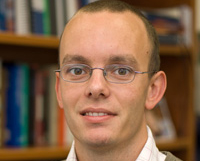Dirk Fey is a Postdoc Research Fellow at Systems Biology Ireland, University College Dublin.
Can you summarise your career path?
Studied Engineering Cybernetics in Stuttgart, then went to Thomas Jefferson’s in Philadelphia to learn about cell biology and medicine. After a brief stint in the chemical industry (BASF, Ludwigshafen), I went for a rather mathematical PhD on biology-inspired topics in systems theory. During this time I worked in many labs in different countries, including Ireland, the UK and finally Belgium, where I got my PhD from the University of Liege. In 2011, I joined Boris Kholodenko’s lab in Systems Biology Ireland, where I have been since. Most recently, and with the help of the NDRC (FutureHealth pre-accelerator programme), I also started a commercial venture called OncoNamics, which aims at translating my research into clinical products and services.
Where do your best ideas emerge from?
It’s difficult to say, they tend to sneak up on me (and studying creativity is actually a science in its own right.) But I try to keep an open mind, surround myself with interesting people and satisfy my curiosity about (almost) everything. The interdisciplinary environment in SBI and all the interesting people visiting Dublin, including several Nobel laureates, really help. I am already looking forward to meeting John O’Keefe (2014 Nobel price), who will come to UCD this September.
Who or what had or has had the strongest positive influence on your career and work?
That would be my former “nonlinear systems and dynamics” professor from Stuttgart, Prof. Dr.-Ing. Dr.h.c. Michael Zeitz, who got me into science. He was one of the toughest professors I have ever met and that, amongst other things, injected a certain amount of resilience into us students and, driven by his passion, made us care.
What do you consider the greatest challenge or hurdle for progress in your field?
Putting all the biochemical and molecular detail into its proper physiological context. What I mean by that is building dynamic, mechanistic models all across the scales from the genetic to the cellular to the organism level and beyond; even taking evolution into account. How can we link the models on the different scales? How can we seamlessly zoom in and out?
What are, in your opinion, the opportunities, directions or decisions that are vital to progress systems medicine?
Well, biology has to become predictive. And by predictive I mean in the sense engineering does; that we can actually simulate what is going on in each individual patient. There are many hurdles to overcome of course, but for that to happen we have to build models purposefully. You have to start with a clinical question to solve a clinical problem. As always, the devil is in the detail and some say it will never work. But that is missing the point. It’s about the process. If a model does not work, then you are just not there yet. The process of building the model will tell you where the gaps are, and then the real work starts; filling in those gaps.
Tell us what would have to happen in your work for you to say “A dream has come true!”?
That mathematical models are actually used in the clinic, maybe in the form of an easy to use app for doctors, to simulate treatments, inform decisions and optimise outcomes.
If you could not be a scientist, what would you like to be?
I was trained as control engineer, so I guess building robots. …actually, I cannot imagine doing anything else.
What was your greatest experience as a scientist?
Probably becoming one in the first place! I was a young undergraduate working in a printing factory for the summer (needed the money) when I got a call from my dynamical systems professor asking me whether I would like to start in his lab. I was so happy, because finally I could do what I wanted AND get (some) money for it!
With which historical person, politicians or celebrity would you like to have a dinner and discuss your work?
That has to be Erwin Schroedinger. Because I am a big physics fan, because he wrote the book “What is Life” and because of his connection to Dublin (and Stuttgart, where I studied).
Would you be happy to share something about your private life and activities in your spare time?
On a good, sunny day I like enjoying the Irish outdoors with its magnificent landscapes. I also rediscovered Lego, and on a bad, rainy day I enjoy playing it with my two sons.
